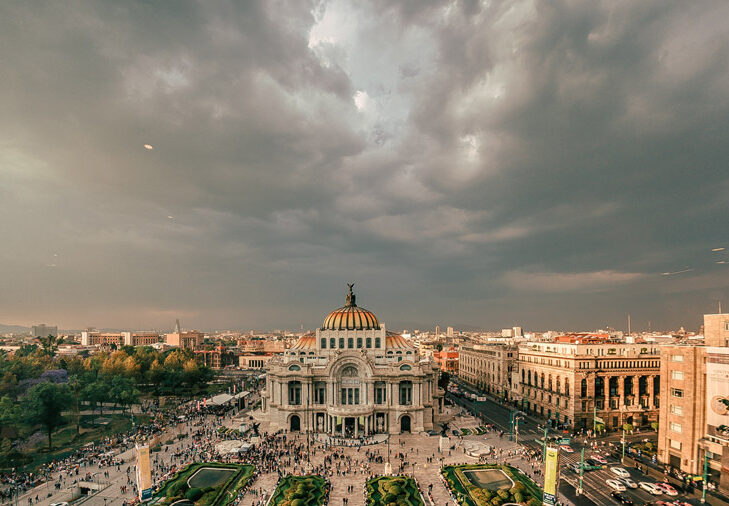
Court delivers major blow to Mexico’s ethanol industry
In June 2017, Mexico’s Energy Regulatory Commission (CRE) amended the official Mexican quality specification for petroleum products, NOM-016-CRE-2016, to enable a maximum 10% ethanol blend (E10) in gasoline. The amendment increased the pre-existing 5.8% blend level nationwide, excluding populous areas Mexico City, Guadalajara and Monterrey where a complete ethanol ban has been maintained.
In a major blow to the ethanol industry in Mexico, the county’s Supreme Court has voted four-to-one to invalidate the three-year-old modification to gasoline regulation, claiming the changes were “unconstitutional”, “unilateral” and citing the potential for higher pollution levels. On 15 January 2020, the second chamber of the Supreme Court granted Amparo, or legal protection, shelving permission for national oil company Petróleos Mexicanos (PEMEX), and other fuel retailers to sell the higher ethanol blend. The ruling will take effect in mid-July 2020, allowing distributors 180 days to adjust to the decision.
On the surface, a ban on E10 seems a curious decision.
Ethanol-blended petrol is used widely in the United States, Europe, and by Mexico’s Latin American counterpart Brazil. The fuel source offers a reduction in fossil fuel dependence, higher use of renewable energy — and has been linked to reductions in greenhouse gas emissions.
 A 2016 document released by the Renewable Fuels Association (RFA), the leading trade association for America’s ethanol industry, claims corn ethanol can reduce direct greenhouse gas emissions by 44% relative to gasoline. Even when hypothetical land-use change emissions are included, corn ethanol from the average dry mill can achieve a 34% reduction, they claim. Ethanol fuel has also been associated with lower gasoline prices and has the potential to boost the local agricultural community. CRE previously argued that Mexico is at a disadvantage compared to neighbouring U.S. states where ethanol has aided cheaper fuel prices.
A 2016 document released by the Renewable Fuels Association (RFA), the leading trade association for America’s ethanol industry, claims corn ethanol can reduce direct greenhouse gas emissions by 44% relative to gasoline. Even when hypothetical land-use change emissions are included, corn ethanol from the average dry mill can achieve a 34% reduction, they claim. Ethanol fuel has also been associated with lower gasoline prices and has the potential to boost the local agricultural community. CRE previously argued that Mexico is at a disadvantage compared to neighbouring U.S. states where ethanol has aided cheaper fuel prices.
However, Mexico’s Supreme Court decision submits that CRE exceeded their authority in the modification of the fuel standard. The court concluded that a more rigorous and science-based consideration of ethanol’s environmental risks, including its contributions to greenhouse gas emissions, is required. Also, the ruling advised a change with significant potential environmental risks should not be enacted without public participation.
In nearby Brazil, the blending of ethanol with gasoline has been obligatory since 1976. Current legislation mandates a 25% ethanol and 75% gasoline blend (E25). In the United States, 98% of gasoline contains ethanol, typically E10. Notably, the United States and Brazil are the world’s two largest producers of ethanol, accounting for approximately 85% of the world’s ethanol production in 2018, according to the RFA.
 In May 2019, the Trump administration announced a change to extend sales of E15 gasoline year-round, following an election pledge to U.S. corn farmers — many of whom have taken a hammering as a result of the ongoing U.S.-China trade war. A summertime ban was imposed on E15 in 2011 by the U.S. Environmental Protection Agency (EPA), due to concerns over smog pollution associated with higher ethanol fuels.
In May 2019, the Trump administration announced a change to extend sales of E15 gasoline year-round, following an election pledge to U.S. corn farmers — many of whom have taken a hammering as a result of the ongoing U.S.-China trade war. A summertime ban was imposed on E15 in 2011 by the U.S. Environmental Protection Agency (EPA), due to concerns over smog pollution associated with higher ethanol fuels.
Mexico is a very different fuel market to the U.S. and Brazil. PEMEX monopolized the local market until recent energy reforms began to erode its market share. As of 30 June 2019, PEMEX controlled 9,161 gas stations, representing 73.3% of the total Mexican market. Its nearest competitors are Oxxo Gas, with 541 service stations, and BP, with 450 service stations. With the emergence of ethanol fuels and billions of dollars on the line, there is potential for a major conflict between powerful special-interest groups such as large oil producers and ethanol producers. The blend wall is the battleground in this skirmish.
Ethanol and methyl tert-butyl ether (MTBE) are both additives that are added to gasoline to boost octane and to enable a more complete tailpipe burn. Ethanol exporters in the United States claim that ethanol delivers cleaner air than MTBE. MTBE has been banned throughout most U.S. states due to its potential to contaminate underground water supplies when there is a leak in the underground tank.

MTBE has long been the oxygenate of choice for PEMEX, with some industry stakeholders suggesting it is a better additive for the Mexican market. However, the Mexican Association for Sustainable Mobility (AMMS) has pointed the finger at MTBE producers in a statement claiming they “systematically obstructed” the growth of ethanol in Mexico’s fuel market. Irrespective of this claim, a lack of ethanol infrastructure is also a barrier to expanded ethanol usage in the country. MTBE can be stored and transported in existing gasoline pipelines and tanks, whereas ethanol must remain separate until final blending at the terminal.
Movements in Mexico are in stark contrast to those in Brazil, where biofuel consumption is increasing across the board, part of an effort to meet its obligations under the Paris Climate Agreement. In March 2020, the largest South American country increased the biodiesel blend sold at the pump from 11% (B11) to 12% (B12). This is the second 1% increase in less than a year, the previous increase to 11% occurring in September 2019. Brazil plans to increase biodiesel blends to 15% by March 2023 by way of annual 1% increases.
The RenovaBio program, Brazil’s National Biofuels Policy, was established in 2016 to encourage the production of sugarcane-based ethanol and biodiesel. Tests on the impact of 20% and 30% biodiesel are currently underway. The region currently has 11 plants working on expansions and 10 new plants under construction, according to the Biodiesel producer’s association Ubrabio. The organisation expects production capacity to reach 12.6 billion litres once the additional capacity is operational.
Mexico is not the only major country dragging its feet on ethanol adoption. China suspended its nationwide rollout of E10 in January 2020, amid a sharp decline in corn stocks and production capacity limitations, a major blow to domestic ethanol producers.







